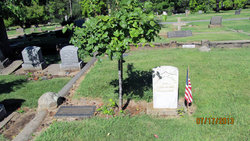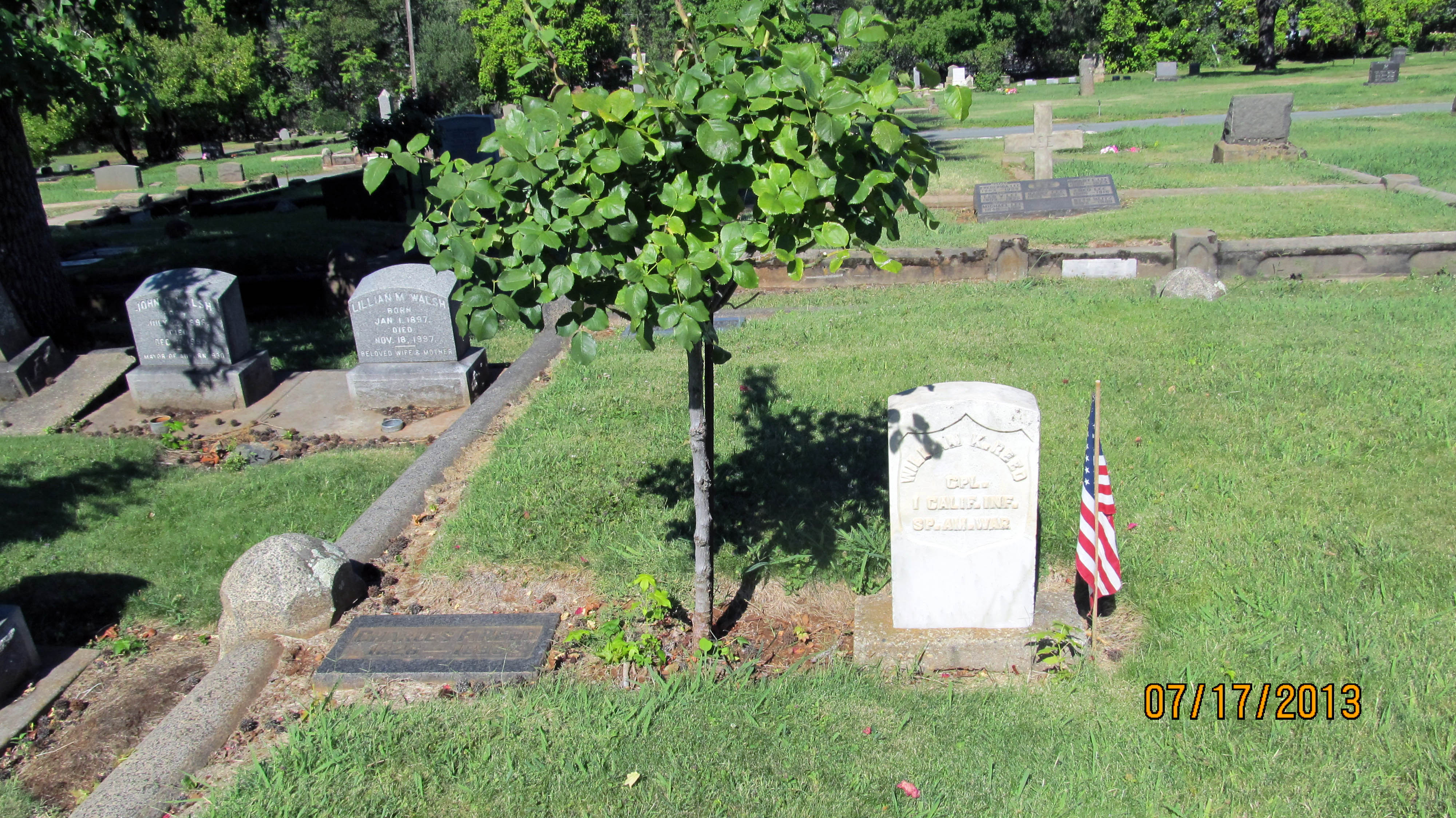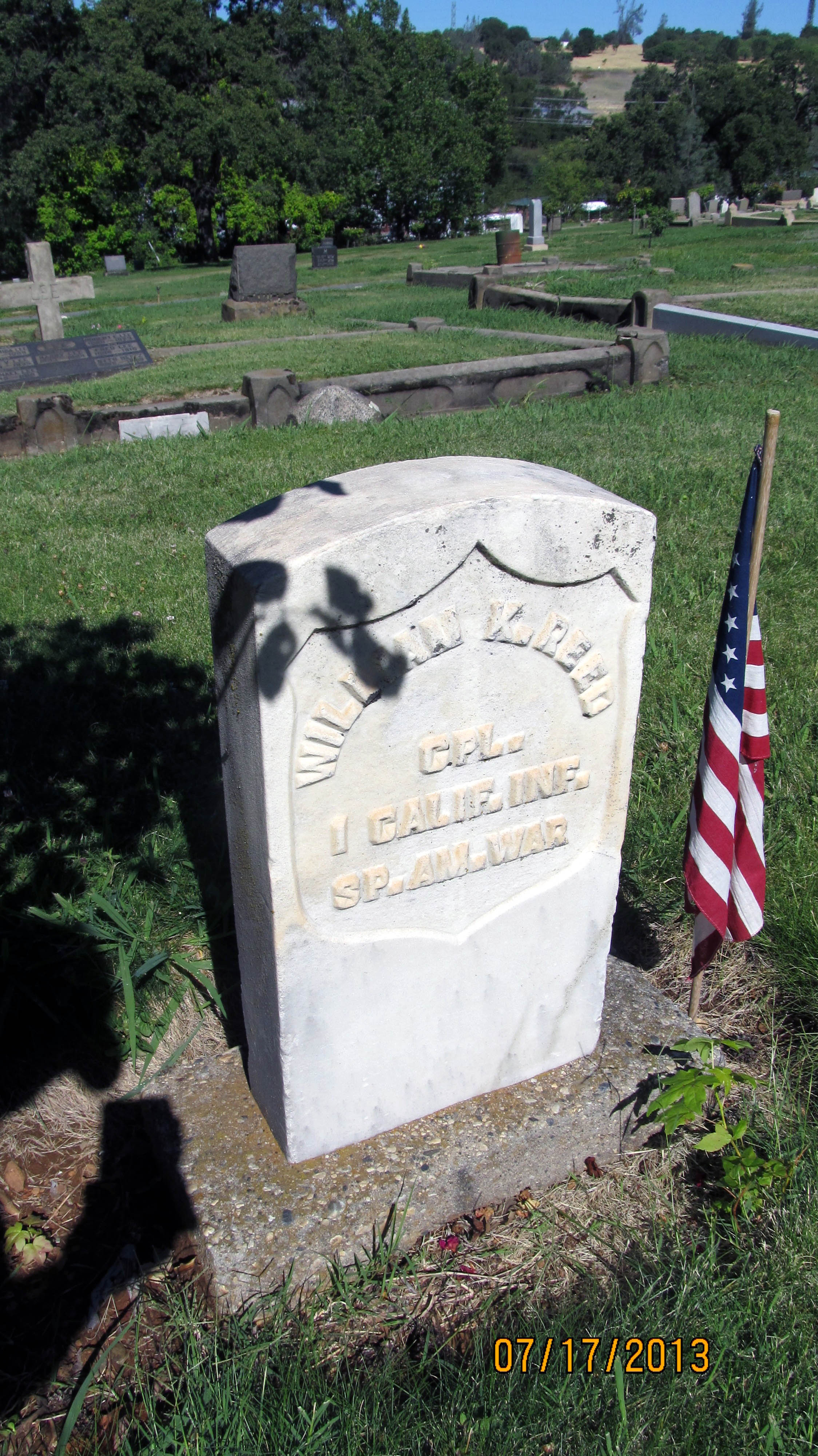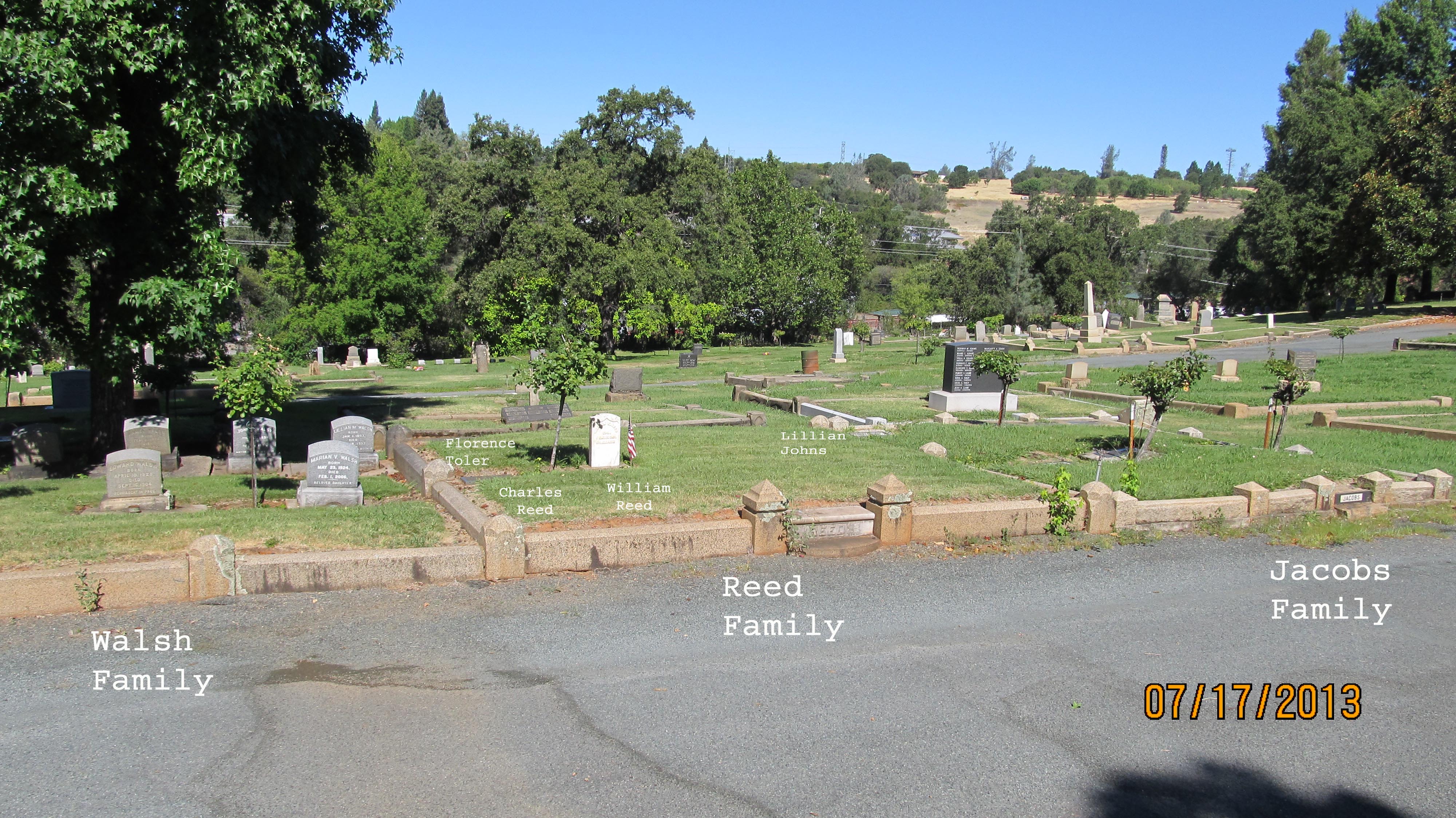CPL 1 Calif Inf
SP AM WAR
AN AUBURN BOY IN MANILA
William Reed Writes of his Trip to the Philippines--The following extracts are from an interesting letter received by Mrs. J. H. Toler from her brother William K. Reed, dated at Manila, July 1: "We sailed from Honolulu under sealed orders which were opened when we were 24 hours out, and they were that we were to take the island of Guam which is one of the Ladrone group and is 3,334 miles from Honolulu. We were 15 days in getting there. The voyage was magnificent; it couldn't have been better. The weather was grand although it was quite hot. Two days before we got to Guam, we all stopped and a boat from the Charleston came to our ship and took some of our officers over to the Australia to a council of war. After they had returned, we learned that they had decided that troops from our ship should be the landing party. When we received this message, we were as happy as could be. There were all kinds of rumors going around. They said there were 1,200 regulars there and two gunboats; so we expected to have some fighting, and the next day very nearly all on board were writing letters. The next morning we were up at 4 o'clock and could just see land; we sailed to within 10 miles of the island and then separated; the Charleston went into the harbor, carefully sounding her way. There was a fort and a ship in the harbor. The Charleston opened fire on the fort, and after the first shot the ship which was lying in the harbor hoisted the Japanese merchant flag. The fort made no reply. The Charleston fired 12 shots in all, and after she had stopped firing, a boat came out from a little town to see what was the matter. They didn't know anything about the war and were sent back to get the governor of the island. They were given 24 hours to surrender in, but when the time was up and the governor didn't come, about 200 men were sent after him. Before they had gone far, he came and gave himself up. Afterwards we took 50 other prisoners and left the island the next day. After the island had surrendered, some officers and men went ashore to explore, and they said that it was a very beautiful island; everything grows wild; they don't have to cultivate anything -- corn, limes, lemons, bananas, oranges, sugarcane, cotton, tobacco, and all tropical fruits. They say that a fortune may be made there in 10 years' time, and I believe it. The natives are a peace-loving people; they are dark like the Spanish and handsome. They hate the Spanish people and say that they take everything from them; they won't even allow them to carry a knife with a point on it. There is a Catholic church and five priests on the island, and in the church one of our boys saw some old parchment written in Latin that must be hundreds and hundreds of years old. When the Charleston opened fire, all the natives ran to the hills but came down again to see what monster was in the harbor. That night they were scared by the searchlights which they said were the eyes of the moon. We left the island Wednesday, June 22, and have now been sailing six days and are now in sight of the island of Luzon, upon the southern and of which Manila is situated. We will not be in the harbor for a day yet as the island is very large. Last night we had a storm, and it was quite wet; of course, my usual luck, I was on guard on deck and was soaked. I have earned the nicknames of "Jimmy Few Clothes" and "Wikeka the Native" because I run around with nothing on but a breechcloth; it's cool so nobody cares. It is very hard to get a lead pencil, paper, or soap. We are having a regular picnic; I wouldn't miss it for anything. I haven't had a day's sickness since I was sea-sick. We live well as we can buy all we want to eat. We expect to land at Cavite, a fort 15 miles from Manila, where we will go into garrison and wait until all of the troops arrive, then Dewey will shell the town, and we will stop the retreat and take possession of Manila. Sounds simple, doesn't it? But it'll not be so simple when it comes to action."
"July 1. We are now in Manila Bay, entirely surrounded by warships. There are nine in all and only one has a scar on it. Since writing the first part of this letter, we have been through quite a storm. A ship bore down on us, and the Charleston stripped for action and went out to meet her. She turned out to be the Baltimore. That night it was quite rough, and in the night we went through a fine storm. The waves dashed over the deck, and everything that was loose went sliding around -- no sleep that night. The next day we went into the harbor; it is full of warships of all nations. There are four Spanish ships here, but they are all sunk. We go ashore today into barracks, and the mail also leaves today by way of Hong Kong. Write soon and remember me to all."
[Placer Herald, Auburn, Saturday, 8-13-1898]
CPL 1 Calif Inf
SP AM WAR
AN AUBURN BOY IN MANILA
William Reed Writes of his Trip to the Philippines--The following extracts are from an interesting letter received by Mrs. J. H. Toler from her brother William K. Reed, dated at Manila, July 1: "We sailed from Honolulu under sealed orders which were opened when we were 24 hours out, and they were that we were to take the island of Guam which is one of the Ladrone group and is 3,334 miles from Honolulu. We were 15 days in getting there. The voyage was magnificent; it couldn't have been better. The weather was grand although it was quite hot. Two days before we got to Guam, we all stopped and a boat from the Charleston came to our ship and took some of our officers over to the Australia to a council of war. After they had returned, we learned that they had decided that troops from our ship should be the landing party. When we received this message, we were as happy as could be. There were all kinds of rumors going around. They said there were 1,200 regulars there and two gunboats; so we expected to have some fighting, and the next day very nearly all on board were writing letters. The next morning we were up at 4 o'clock and could just see land; we sailed to within 10 miles of the island and then separated; the Charleston went into the harbor, carefully sounding her way. There was a fort and a ship in the harbor. The Charleston opened fire on the fort, and after the first shot the ship which was lying in the harbor hoisted the Japanese merchant flag. The fort made no reply. The Charleston fired 12 shots in all, and after she had stopped firing, a boat came out from a little town to see what was the matter. They didn't know anything about the war and were sent back to get the governor of the island. They were given 24 hours to surrender in, but when the time was up and the governor didn't come, about 200 men were sent after him. Before they had gone far, he came and gave himself up. Afterwards we took 50 other prisoners and left the island the next day. After the island had surrendered, some officers and men went ashore to explore, and they said that it was a very beautiful island; everything grows wild; they don't have to cultivate anything -- corn, limes, lemons, bananas, oranges, sugarcane, cotton, tobacco, and all tropical fruits. They say that a fortune may be made there in 10 years' time, and I believe it. The natives are a peace-loving people; they are dark like the Spanish and handsome. They hate the Spanish people and say that they take everything from them; they won't even allow them to carry a knife with a point on it. There is a Catholic church and five priests on the island, and in the church one of our boys saw some old parchment written in Latin that must be hundreds and hundreds of years old. When the Charleston opened fire, all the natives ran to the hills but came down again to see what monster was in the harbor. That night they were scared by the searchlights which they said were the eyes of the moon. We left the island Wednesday, June 22, and have now been sailing six days and are now in sight of the island of Luzon, upon the southern and of which Manila is situated. We will not be in the harbor for a day yet as the island is very large. Last night we had a storm, and it was quite wet; of course, my usual luck, I was on guard on deck and was soaked. I have earned the nicknames of "Jimmy Few Clothes" and "Wikeka the Native" because I run around with nothing on but a breechcloth; it's cool so nobody cares. It is very hard to get a lead pencil, paper, or soap. We are having a regular picnic; I wouldn't miss it for anything. I haven't had a day's sickness since I was sea-sick. We live well as we can buy all we want to eat. We expect to land at Cavite, a fort 15 miles from Manila, where we will go into garrison and wait until all of the troops arrive, then Dewey will shell the town, and we will stop the retreat and take possession of Manila. Sounds simple, doesn't it? But it'll not be so simple when it comes to action."
"July 1. We are now in Manila Bay, entirely surrounded by warships. There are nine in all and only one has a scar on it. Since writing the first part of this letter, we have been through quite a storm. A ship bore down on us, and the Charleston stripped for action and went out to meet her. She turned out to be the Baltimore. That night it was quite rough, and in the night we went through a fine storm. The waves dashed over the deck, and everything that was loose went sliding around -- no sleep that night. The next day we went into the harbor; it is full of warships of all nations. There are four Spanish ships here, but they are all sunk. We go ashore today into barracks, and the mail also leaves today by way of Hong Kong. Write soon and remember me to all."
[Placer Herald, Auburn, Saturday, 8-13-1898]
Family Members
Sponsored by Ancestry
Advertisement
Advertisement












